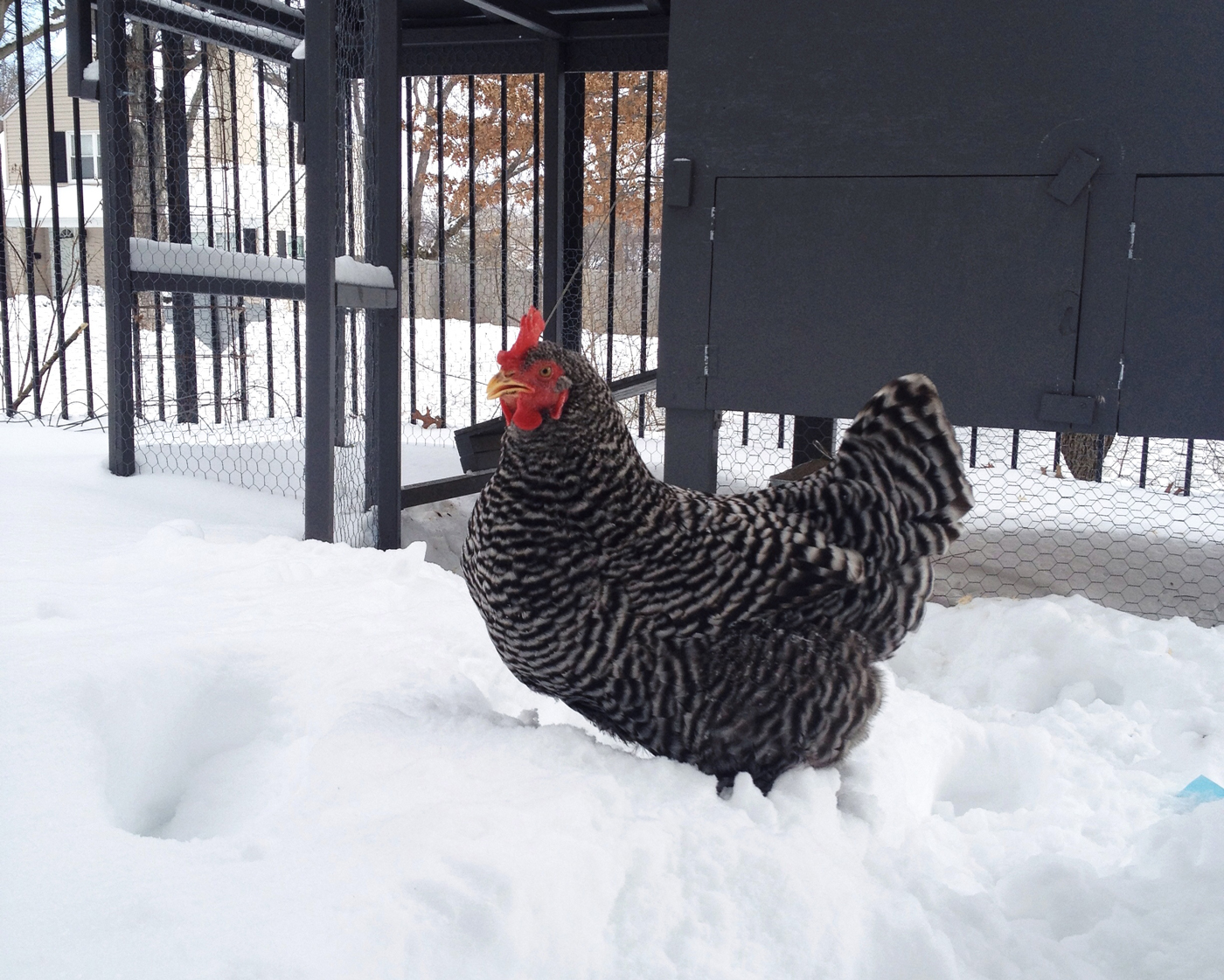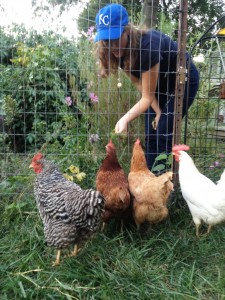Backyard Chickens in Winter: How We Keep Our Hens Healthy and Laying Eggs Throughout Kansas City’s Cold Season
One of the first questions people ask me when they learn that I keep chickens is: “What do you do with them in the winter?” To their surprise, I tell them that our hens adapt to the cold and that we just keep feeding and watering them as usual. While this is mostly true, there are a few additional tips and tricks to keeping chickens in cold climates:
TIPS FOR KEEPING CHICKENS HEALTHY AND PRODUCTIVE IN COLD WINTER CLIMATES
- Choose the Right Breed: Some poultry breeds are more cold hardy than others, which relates to their comb and wattle size, and feather pattern. If you live in Kansas City, choose a breed that is cold hardy. My breeds are Barred Plymouth Rock, White Leghorn, Red Star (aka “sex-link”), and Rhode Island Red. Of these, I would say my leghorn is the least cold tolerant due to her huge comb.
- Keep the Water Wet: No chicken can drink frozen water, so invest in a water heater to keep it from freezing.
- Daily Food and Water: Yes, it is cold and miserable outside, but you have taken the responsibility of being a chicken owner. Get your rear outside every day to give them clean, fresh water and feed them. It will keep them healthy.
- Artificially Extend Daylight: We’ve noticed that the short winter days tend to have a negative effect on the egg production of our hens. Using a light in the coop to add couple extra hours of “daylight” can aid production.
- Practice Good Coop Housekeeping: With the onset of shorter days and winter storms, your chickens will spend more time in the coop than usual. Do you know what this means? You guessed it – more poop in the coop! Remove the droppings and change their bedding on a regular basis; it will keep them happy and healthy, and hopefully they will continue to lay eggs for you.
- To Heat or Not to Heat the Coop?: If you have healthy, cold-hardy breeds and a well-built, dry coop which blocks the wind and elements, you may not need to heat your coop. Unfortunately, there is no perfect answer to this question and everyone does it differently. Ordinarily, we do not heat the coop, and our hens are fine; however, this winter is an exception. If the storms, wind, and temperatures below 0ºF weren’t bad enough, we currently have two molting* hens. *Molting is the annual process wherein a chicken loses and regrows its feathers. This generally occurs in Fall.
- Lube the Comb: Experts say that rubbing petroleum jelly onto your chickens’ comb and wattles will prevent frostbite. Yes, I realize that this sounds completely bizarre. It always makes me feel like such a weirdo and the chickens hate to be fiddled with, but it is a smart thing to do.
- Be Pragmatic: In January of 2014, we Kansas Citians are experiencing some of our coldest weather in 20 years. With temperatures and windchills expected to drop well below zero, my husband and I made the decision to bring our chickens indoors for a night. I used an old dog crate to create a temporary coop in our garage, and we rounded up the hens. I wasn’t sure how they would respond to the move, but within a couple hours of their relocation, one hen had already laid an egg in her temporary home – no egg box required!
Want to find a chicken-friendly property in the Kansas City area?
I can help you find a home where chickens are legal, welcome, and practical.








Hi Sarah. We were your neighbors a few years ago and are now in San Diego. We just got our own backyard chickens yesterday. Still chicks, really- A white leghorn, two barred rocks, and a black star. Teh girls love them! I just thought of you guys and your chickens and wondered how they were doing. Hope you all are well!
Katy
Katy, It is so nice to hear from you. I wonder about you guys from time to time. Too bad you had to move away so quickly, but San Diego doesn’t sound so bad 😉
That will be a beautiful flock! I love those breeds, and they will all be great layers. What a wonderful thing for you girls to be a part of. We have a baby now, and I’m looking forward to teaching him all about food, eggs, gardening, etc. We are all doing well here – finally Spring has arrived!
All my best,
Sarah